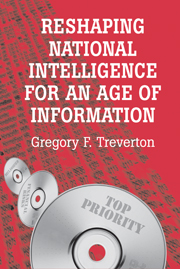Book contents
- Frontmatter
- Contents
- Foreword
- Preface
- Note on sources
- 1 The imperative of reshaping
- 2 The world of intelligence beyond 2010
- 3 The militarization of intelligence
- 4 Designated readers: the open source revolution
- 5 Spying, looking, and catching criminals
- 6 The intelligence of policy
- 7 A reshaped intelligence
- Index
5 - Spying, looking, and catching criminals
Published online by Cambridge University Press: 23 May 2010
- Frontmatter
- Contents
- Foreword
- Preface
- Note on sources
- 1 The imperative of reshaping
- 2 The world of intelligence beyond 2010
- 3 The militarization of intelligence
- 4 Designated readers: the open source revolution
- 5 Spying, looking, and catching criminals
- 6 The intelligence of policy
- 7 A reshaped intelligence
- Index
Summary
As a young Senate staffer I was once briefed by Ted Shackley, then the head of the East Asia division of the Directorate of Operations (DO) and later deputy director for operations (and still later under suspicion for questionable arms dealings once he'd retired from the CIA). It was 1976, and we were sitting in a room at CIA headquarters in Langley with a combination lock on the door. Shackley began by saying: “I'm in the business of producing spies. If I wanted to produce widgets, I'd be in private industry.” At the time I was mightily impressed. I had studied at a school of management, and most of my reading about and experience of foreign affairs had left me with the impression that its practitioners didn't think they produced anything. In contrast, Shackley did. He knew what he produced.
It was only later that I realized I was wrong and so was Shackley. He didn't produce spies. He didn't even produce information. What he really produced, or sought to, was useful insights in the heads of policy-makers who needed to act. Spies were only a way station to those insights. So was information. Yet the culture of the DO treats producing spies as the goal, not the way station.
It is not easy for outsiders to write about spying. But if war is too important to be left to the generals, espionage is too sensitive to be left to the spymasters.
- Type
- Chapter
- Information
- Reshaping National Intelligence for an Age of Information , pp. 136 - 176Publisher: Cambridge University PressPrint publication year: 2001

